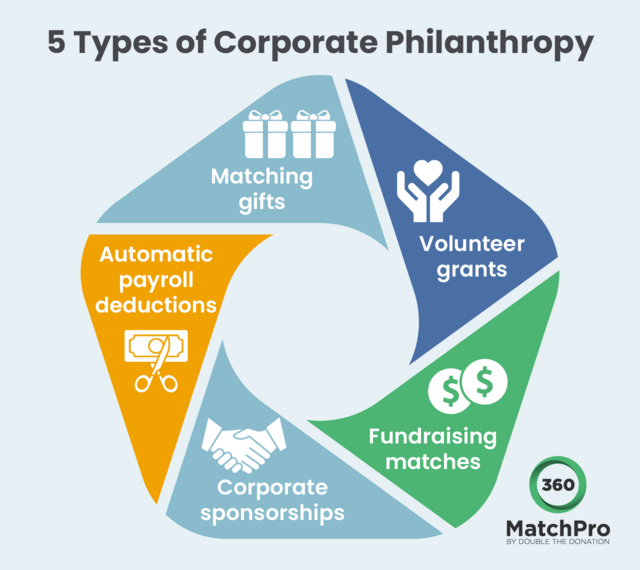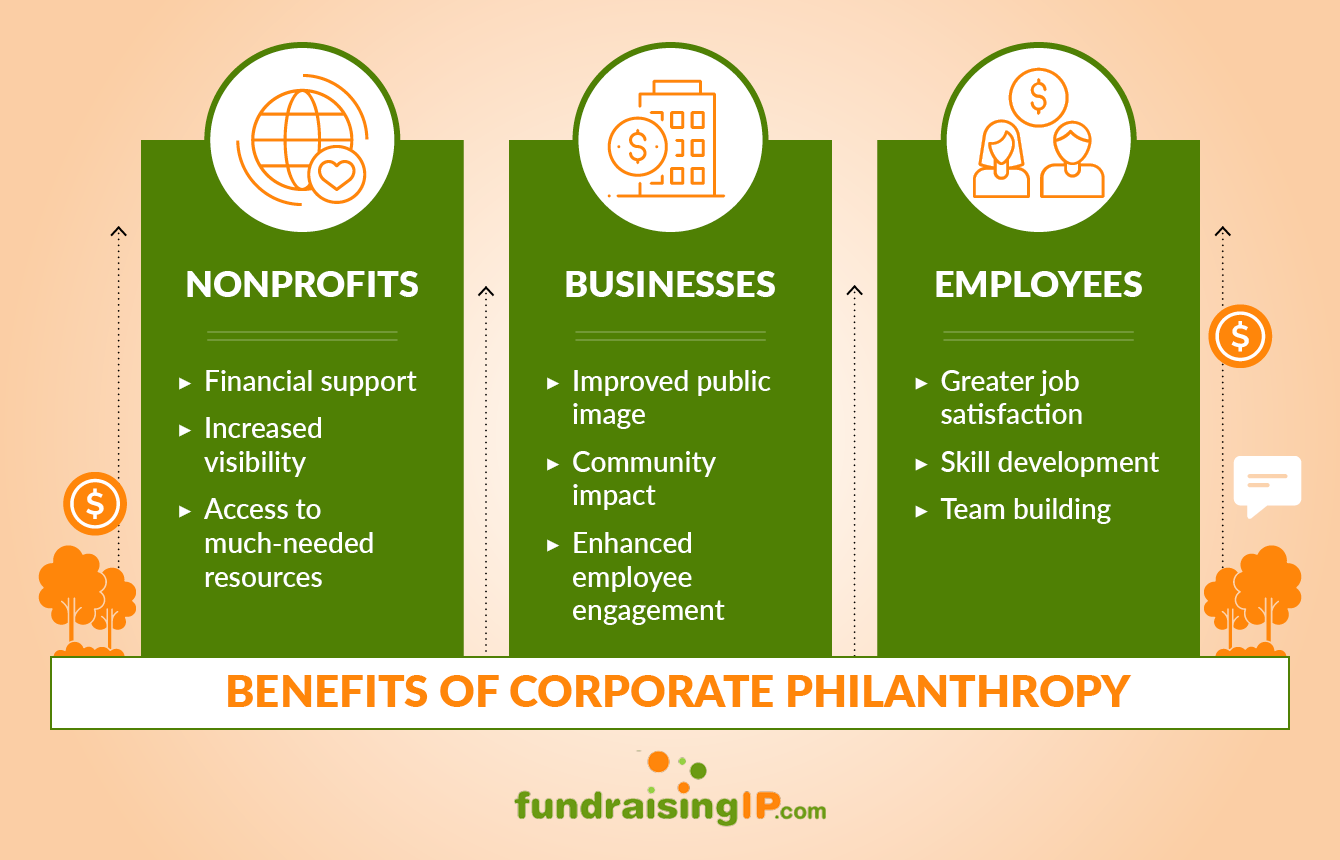Exploring Just How Business Philanthropy Shapes Brand Online Reputation and Client Loyalty
Company philanthropy considerably influences brand name track record and customer commitment. Business that participate in genuine charitable campaigns typically see a positive change in how customers perceive them. This placement of values cultivates depend on and emotional connections with target markets. The performance of these philanthropic initiatives can vary considerably. Understanding what genuinely resonates with consumers is crucial for brands looking for to enhance their social effect and market placement. What techniques will arise as important for future success?
The Advancement of Corporate Philanthropy
As services significantly recognize their function in culture, the evolution of business philanthropy has actually changed from mere philanthropic contributions to a strategic element of brand name identification. Initially, business took part in philanthropy largely for tax benefits or to improve their public image. With time, this approach shifted as stakeholders-- including capitalists, employees, and consumers-- demanded a much more genuine dedication to social duty.
Organizations started straightening their kind campaigns with their core worths and organization objectives, leading to more thoughtful and impactful contributions. This adjustment has actually urged firms to purchase lasting methods and neighborhood advancement, fostering a sense of objective that reverberates with customers.
Technological advancements have actually assisted in transparency and involvement, permitting companies to showcase their kind initiatives more effectively. Company philanthropy has arised as an important part of service strategy, with companies embracing the possibility to positively affect society while improving their overall brand story.
The Impact of Philanthropy on Brand Name Perception
While firms take part in humanitarian initiatives to promote social excellent, these initiatives considerably shape brand assumption among consumers. Company philanthropy can enhance a brand name's photo by associating it with favorable social influence and community participation. Customers typically regard brands that actively join philanthropic activities as more trustworthy and liable. This assumption can influence acquiring decisions, as customers may choose brand names that show a commitment to social issues.

Structure Emotional Links Via Granting
Corporate philanthropy acts as a powerful tool for enhancing brand identity by connecting company worths with area demands. Via strategic offering, firms can cultivate area involvement and develop common worths that resonate with consumers on an emotional level. This approach not just reinforces brand name track record however likewise develops long lasting connections in between organizations and their stakeholders.
Enhancing Brand Name Identity
When business engage in philanthropic initiatives, they not just add to societal excellent but also build much deeper emotional connections with their target markets. By aligning their brand name with philanthropic causes, companies improve their identity and signal worths that resonate with customers. This alignment develops a story that goes beyond items and solutions, inviting customers to get involved in a common mission. As consumers increasingly focus on purpose-driven brands, firms that actively take part in providing can differentiate themselves in a congested market. Such initiatives cultivate a sense of commitment among consumers who really feel personally attached to the brand's worths. Ultimately, business philanthropy becomes a crucial tool for boosting brand identification, cultivating enduring relationships based on common beliefs and emotional involvement.
Fostering Neighborhood Involvement
Numerous research studies indicate that business taking part in community-focused philanthropic efforts can markedly enhance psychological connections with their stakeholders. By buying neighborhood tasks and supporting social causes, organizations cultivate a sense of belonging and count on within the area. This engagement promotes a favorable brand name photo, as customers appreciate business that show genuine issue for social concerns. Employees typically really feel a lot more proud and motivated to be associated with an organization that prioritizes neighborhood welfare. Consequently, consumers are much more likely to establish loyalty towards brands that actively add to meaningful reasons. Inevitably, cultivating area involvement via philanthropy not just boosts brand name track record yet likewise develops long lasting emotional ties that profit both the neighborhood and the business it serves.
Creating Shared Worths
Exactly how can services efficiently create shared worths that reverberate with their stakeholders? Business can accomplish this by aligning their philanthropic efforts with their core mission and the interests of their areas. By participating in efforts that attend to neighborhood needs, businesses cultivate psychological connections with customers, boosting brand name loyalty. For example, partnering with non-profits that show shared worths enhances the brand's photo and demonstrates dedication to social obligation. In addition, transparent interaction regarding these initiatives enables stakeholders to see the substantial effect of their contributions. Eventually, by integrating shared worths into their company philanthropy, business not just enhance their reputations however also cultivate long-term connections with consumers, leading to raised loyalty and trust fund. This alignment is crucial in modern customer decision-making.
Case Studies: Effective Philanthropic Campaigns
Examining successful kind campaigns exposes numerous strategies that improve brand name reputation. Impactful neighborhood campaigns, innovative partnership designs, and lasting engagement techniques have actually confirmed effective in promoting favorable links with customers. These case studies highlight the relevance of thoughtful company giving up achieving both social and company goals.
Impactful Area Initiatives
Several companies have successfully leveraged philanthropic campaigns to improve their brand track record while making a purposeful influence in their communities. For example, a technology firm launched a digital literacy program in underserved neighborhoods, offering training and resources that empowered local residents. This initiative not only added to area growth however likewise positioned the company as a socially responsible leader. In a similar way, a significant food business carried out an appetite relief project, partnering with neighborhood nonprofits to disperse meals to families in demand. This effort strengthened area ties and fostered consumer loyalty. With these impactful initiatives, firms have actually demonstrated their dedication to social obligation, efficiently aligning their brand name values with the demands of the neighborhoods they serve, inevitably improving their overall online reputation.
Ingenious Partnership Versions
The success of impactful neighborhood campaigns commonly rests on cutting-edge partnership versions that bring together varied stakeholders to attend to complex social difficulties. Study illustrate just how corporations, non-profits, and federal government entities can collaborate successfully. For instance, an international corporation partnered with a regional charitable to launch an education and learning program, pooling resources find more and proficiency to boost community literacy prices. Another example entailed a tech company and a health care company signing up with forces to establish a telemedicine remedy for underserved populaces. These partnerships not only magnified the reach of kind initiatives but likewise strengthened the brand names' reputations by aligning their objectives with neighborhood demands. Inevitably, cutting-edge partnership models act as a driver for significant modification and foster more powerful links in between brand names and their customers.
Lasting Involvement Strategies

Gauging the ROI of Business Social Responsibility
As firms progressively buy company social obligation (CSR) initiatives, recognizing the return on investment (ROI) connected with these initiatives becomes essential. Gauging ROI in CSR is multifaceted, often including both qualitative and measurable metrics. Financial returns can be analyzed with raised sales, improved brand name loyalty, and boosted worker spirits, which can result in greater productivity. In addition, companies might analyze expense financial savings linked to lasting practices, such as minimized waste or power usage.
Qualitatively, the influence of CSR on brand track record can be evaluated with customer perception research studies and social media sites sentiment evaluation. Studies can provide insights right into just how CSR activities influence consumer commitment and count on. In addition, benchmarking versus industry requirements can aid organizations evaluate their CSR efficiency. Ultimately, a complete strategy to measuring ROI enables business to make educated choices concerning future CSR financial investments, aligning strategies with both monetary efficiency and social influence
Customer Assumptions and Company Responsibility
Increasingly, consumers expect companies to operate with a strong sense of corporate responsibility, seeing ethical practices as a prerequisite for brand loyalty. This shift in assumption mirrors an expanding recognition of ecological and social concerns, leading clients to prefer brands that align with their values. Consumers are more likely to sustain business that take part in transparent practices, show sustainability, and add favorably to their neighborhoods.
Moreover, social media sites magnifies these expectations, allowing customers to share their experiences and opinions promptly. Brand names that stop working to meet these moral standards take the chance of backlash, while those that accept corporate duty commonly delight in enhanced track record and client commitment. As consumers demand liability, business have to integrate company social obligation right into their core techniques, focusing on ethical habits not equally as an advertising strategy, however as a basic aspect of their procedures. This alignment can eventually bring about stronger brand name fondness and sustained success in open markets.
Future Fads in Corporate Philanthropy and Brand Commitment
The landscape of company philanthropy is developing, affected by the intense consumer expectations bordering company responsibility. Business are significantly incorporating social impact into their core service approaches, not merely as a supplementary task. Future fads show a shift toward transparency, with brands sharing in-depth details concerning their philanthropic efforts and their direct impacts on areas.
Modern technology is playing a critical role, enabling real-time engagement between brands and consumers. Social media site systems promote straight interaction, permitting customers to articulate their expectations and hold brands responsible. Additionally, younger generations, particularly Millennials and Gen Z, focus on sustainability and moral techniques, driving services to embrace more conscientious approaches.
As company philanthropy comes to be identified with brand identity, companies that authentically straighten their objectives with societal needs are most likely to cultivate stronger customer commitment. This merging of values will ultimately form the future of business credibility and consumer partnerships in a significantly conscientious marketplace.
Regularly Asked Concerns
How Do Customers Discover a Firm's Philanthropic Efforts?
Consumers uncover a business's philanthropic initiatives through numerous channels, including social media sites, news release, area events, and word-of-mouth. These avenues assist in awareness, making it possible for individuals to involve with brands that straighten with their rate of interests and values.
What Function Does Employee Participation Play in Corporate Philanthropy?
Worker participation in business philanthropy boosts interaction, cultivates a sense of possession, and strengthens group communication - corporate philanthropy. This involvement usually magnifies the influence of charitable campaigns, leading to higher recognition and support for the business's kind efforts
Can Corporate Philanthropy Backfire on a Brand name's Reputation?
If viewed as opportunistic or insincere, company philanthropy can indeed backfire on a brand name's online reputation. Unfavorable public understanding may arise, leading to decreased trust and loyalty amongst customers that focus on credibility in business actions.
Are Smaller Firms as Reliable in Philanthropy as Larger Companies?
Smaller sized firms can be equally effective in philanthropy as larger corporations, commonly showing dexterity and credibility. Their local initiatives might reverberate more deeply with communities, fostering genuine connections despite limited resources compared to their larger counterparts.
Exactly How Can Business Select the Right Triggers to Support?
Companies can choose the best bring on by aligning their worths with area demands, assessing stakeholder passions, and reviewing possible influence. This calculated technique promotes authenticity, enhances engagement, and reinforces links with clients and the wider community.
While companies involve in humanitarian efforts to promote social excellent, these efforts considerably shape brand assumption among consumers. As customers significantly prioritize purpose-driven brands, firms that actively engage in offering can distinguish themselves in a crowded market. Several firms have effectively leveraged philanthropic projects to enhance their brand name track record while making a significant influence in their neighborhoods. Increasingly, customers my site expect firms to operate with a solid feeling of corporate duty, seeing moral methods as a requirement for brand commitment. As business philanthropy becomes associated with brand name identity, firms that authentically align their goals with societal demands are likely to cultivate stronger client commitment.